Column [MySQL]
Favorite poem: I am even more happy with the thousands of miles of snow in Minshan Mountain. After the three armies are over, they are all happy.
Music Sharing【The Right Path】
Welcome and thank everyone for pointing out Xiaoji’s problem
Article directory
- Introduction to stored procedures
- Characteristics of stored procedures
- Stored procedure
-
- ?create
- ?transfer
- ?Check
- ?delete
- Global variables
-
- ?View system variables
- ?Set system variables
- User-defined variables
-
- ?assignment
- ?use
- Local variables
-
- ?statement
- ?assignment
- if judgment
- parameter
- case
- while
- repeat loop
- loop loop
- Cursor (cursor)
- handler
- Storage function

Introduction to stored procedures
A MySQL stored procedure is a precompiled block of code that accepts parameters, performs specific operations, and returns results. A stored procedure is a way to combine multiple SQL statements together to form a reusable unit of business logic, thereby simplifying application development and maintenance.
Characteristics of stored procedures
Can reduce network traffic: Stored procedures on the database server can reduce network traffic between client applications and the database. This is because the stored procedure only needs to send parameters and execute the statement, rather than sending the complete SQL statement each time.
Can improve database performance: Stored procedures can avoid repeatedly compiling and interpreting SQL statements, thereby improving database execution efficiency.
Reusable code can be achieved: Stored procedures can abstract common business logic and form a reusable code base, thereby simplifying application development and maintenance.
Can protect database security: Stored procedures can protect database security by using parameter verification and permission control.
Stored procedure
?Create
create procedure stored procedure name [(parameter list)]
beginend;
?Call
To execute the sql statement in the creation process
call name({parameter});
create procedure p1()
begin
select count(*) from tb_abc;
end;
call p1();

?View
select * from information_schema.ROUTINES where ROUTINE_SCHEMA=database name’; –Specify the stored procedures and status information of the database
show create procedure p1; –Query the definition of a stored procedure

View details

select * from information_schema.ROUTINES where ROUTINE_SCHEMA='abc'; show create procedure p1;
?Delete
drop procedure [if exists] stored procedure name;
drop procedure if exists p1;
Global variables

?View system variables
show session variables;

If you want to query all system variables starting with auto
show session variables like 'auto%';

The above view is at the session level, which is the current session level.
If we want to view theglobal level
Just change session to global
show global variables like 'auto%';

Above we used like, which is fuzzy matching
What should we do if we have found the value of the system variable so far?
Methods as below
select @@autocommit;



?Set system variables
0 means turning off the automatic submission switch, 1 means turning on the automatic submission switch
set session autocommit =0;

We executed it again and found that the session-level auto-commit switch had changed to 0.

User-defined variables

?Assignment
set @myname = 'itcast'; -- None: set @myage :=10; -- Yes: set @mygender :='male',@myhobby :='java';
?Use
select @myname,@myage,@mygender,@myhobby;

Local variables

?Statement
declare
?Assignment
create procedure p2()
begin
declare tb_count int default 0; -- Use declare for local variables
select count(*) into tb_count from tb_abc;
select tb_count;
end;
call p2();

if judgment

Determine the score level corresponding to the current score based on the defined score variable.
score>=85 excellent
score>=60 & amp; & amp; score M< 85 passing
score<60 failed
create procedure p4()
begin
declare score int default 58;
declare result varchar(10);
if score>=85 then
set result:='Excellent';
elseif score>=60 then
set result:='passed';
else
set result:='Failed';
end if;
select result; -- display results
end;
call p4;

Parameters
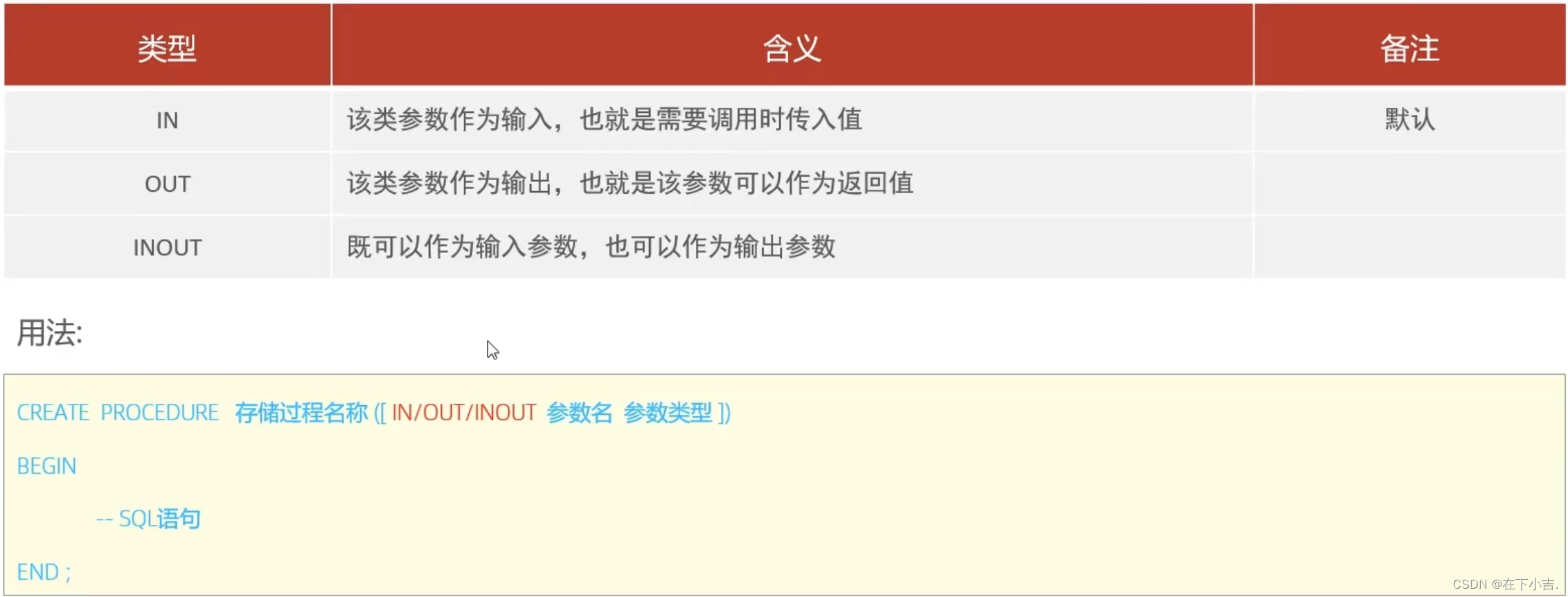
According to the
incoming (in)parameter score, determine the score level corresponding to the current score, andreturn (out)
score>=85 excellent
score>=60 & amp; & amp; score M< 85 passing
score<60 failed
create procedure p5(in score int,out result varchar(10))
begin
# declare score int default 58;
# declare result varchar(10);
if score>=85 then
set result:='Excellent';
elseif score>=60 then
set result:='passed';
else
set result:='Failed';
end if;
#select result;
end;
call p5(68,@result);
select @result;

Convert the incoming 200-point score to the 100-point scale, and then return the score —->
inout
create procedure p6(inout score double)
begin
set score:=score*0.5;
end;
set @score=198;
call p6(@score);
select @score;
The select @score; in this code means that the query is the value of @score after the execution of call p6(@score); in the stored procedure

case
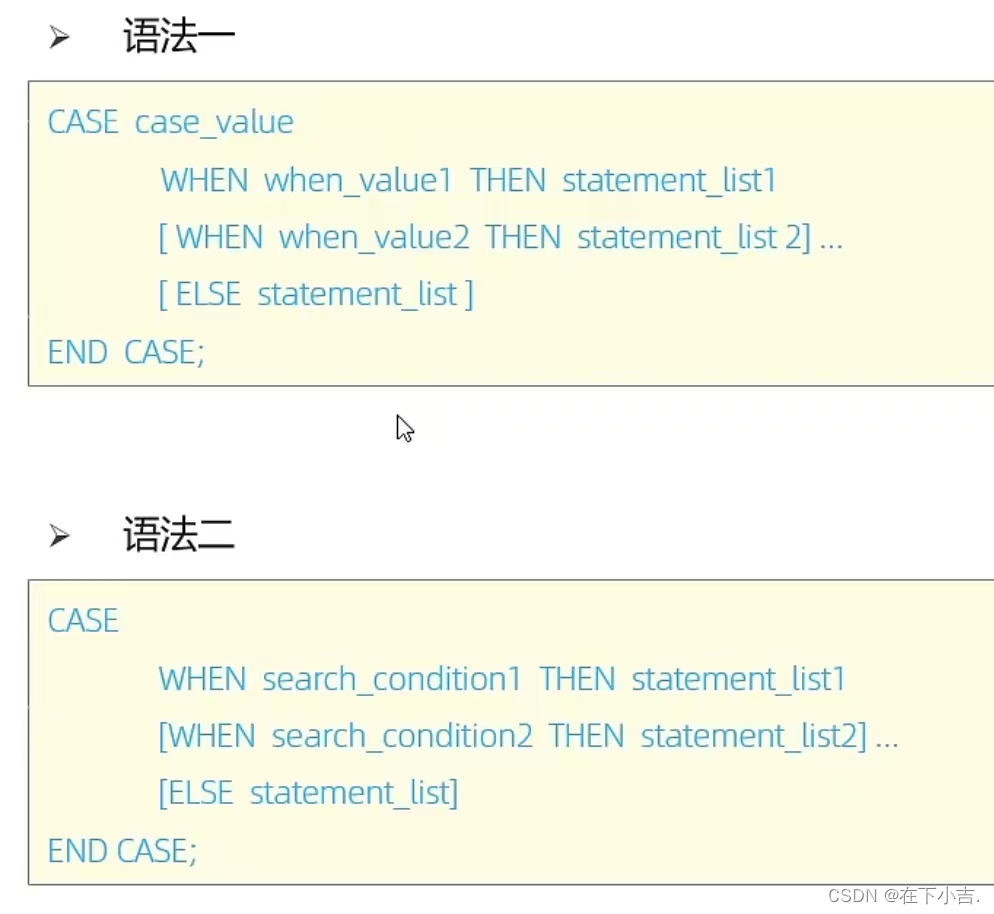
Determine the quarter based on the month passed in
January-March first quarter
April-June second quarter
July-September third quarter
October-December fourth quarter
create procedure p7(in month int)
begin
declare result varchar(10);
case
when month>=1 and month <=3 then
set result :='First Quarter';
when month>=4 and month <=6 then
set result :='Second Quarter';
when month>=7 and month <=9 then
set result :='Third Quarter';
when month>=10 and month <=12 then
set result :='Fourth Quarter';
else
set result:='Illegal parameter';
end case;
select concat('month',month,'quarter',result); -- Use the concat function to concatenate strings
end;
call p7(4);

while
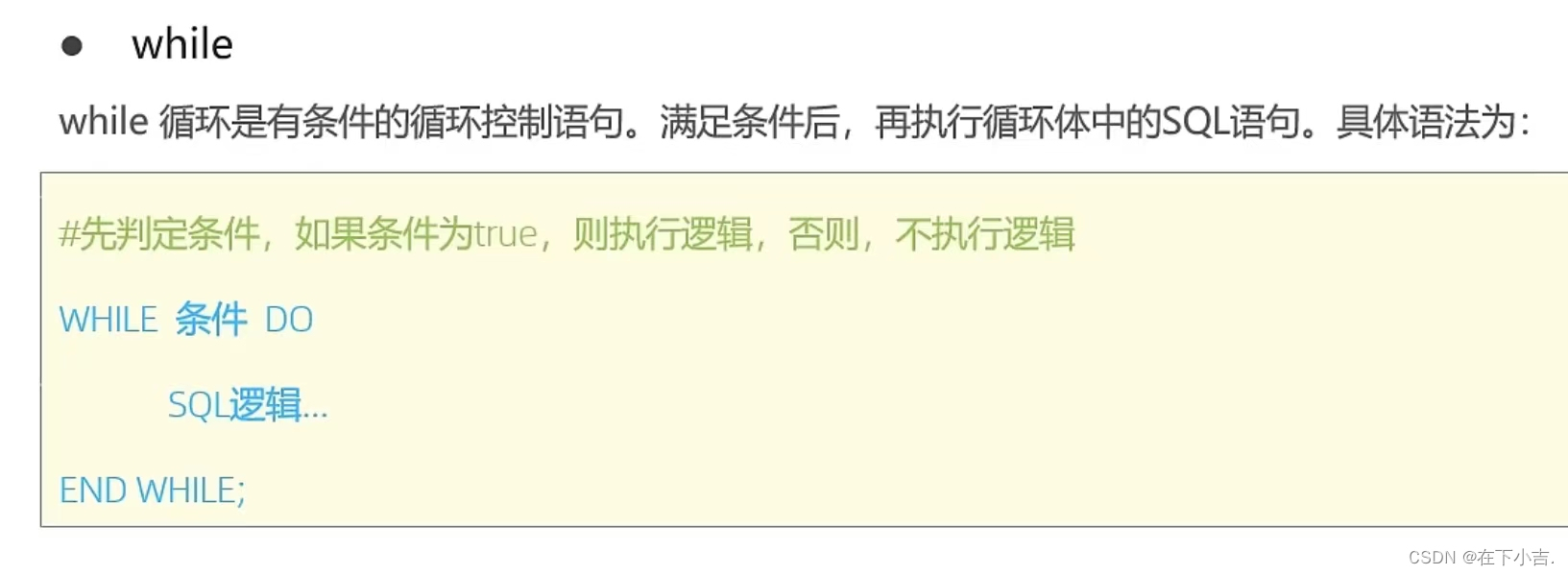
Calculate the value accumulated from 1 to n, n is the parameter value passed in
create procedure p8(in n int)
begin
declare total int default 0;
while n>0 do
set total:=total + n;
set n:=n-1;
end while ;
select total;
end;
call p8(10);

repeat loop

Calculate the value accumulated from 1 to n, n is the parameter value passed in
create procedure p9(in n int)
begin
declare total int default 0;
repeat
set total:=total + n;
set n:=n-1;
until n<=0
end repeat;
select total;
end;
call p9(10);

while satisfies the condition
performloop
repeat satisfies the conditionExitloop
loop
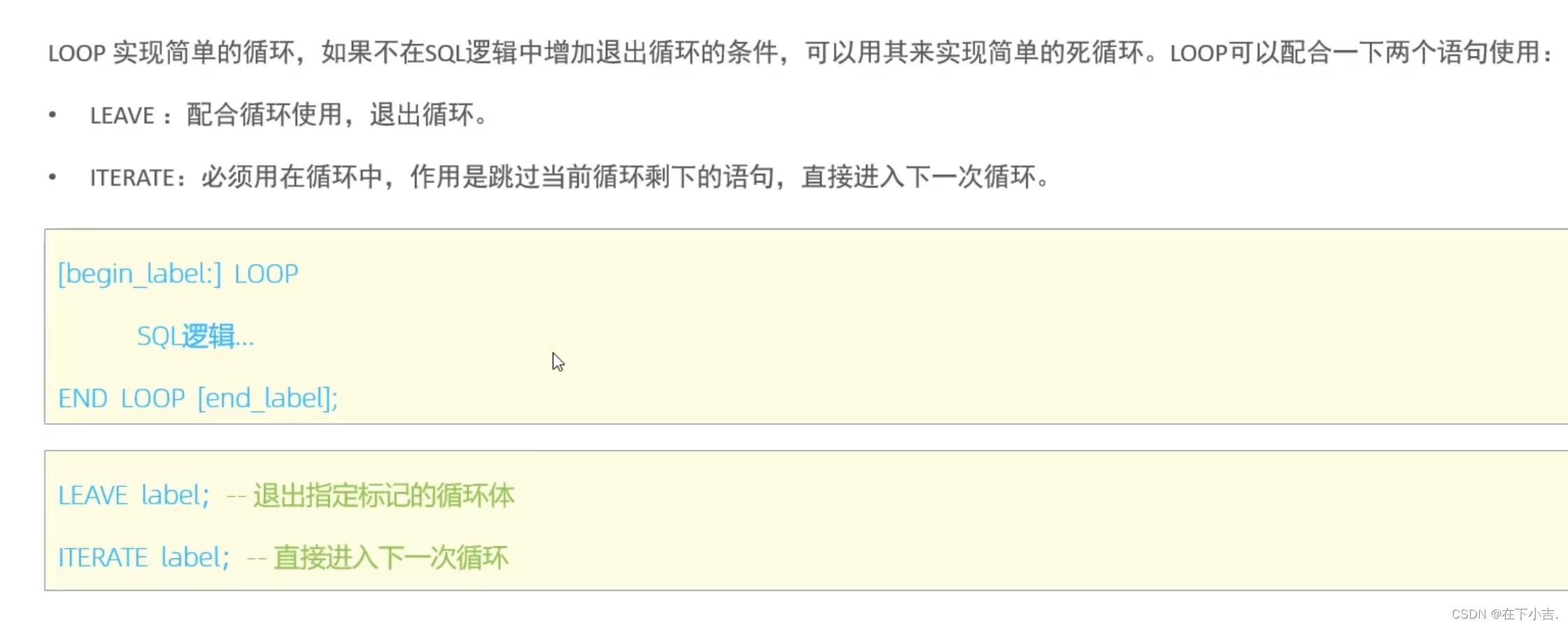
Calculate the value accumulated from 1 to n, n is the parameter value passed in
create procedure p10(in n int)
begin
declare total int default 0;
sum:loop
if n<=0 then
leave sum;
end if;
set total:=total + n;
set n:=n-1;
end loop sum;
select total;
end;
call p10(100);

Cursor (cursor)

Query employees with ID less than uid and store their information in a new table

After we ran it, we found that the operation failed and an error was reported.
To solve this problem, we have to use the following method
handler
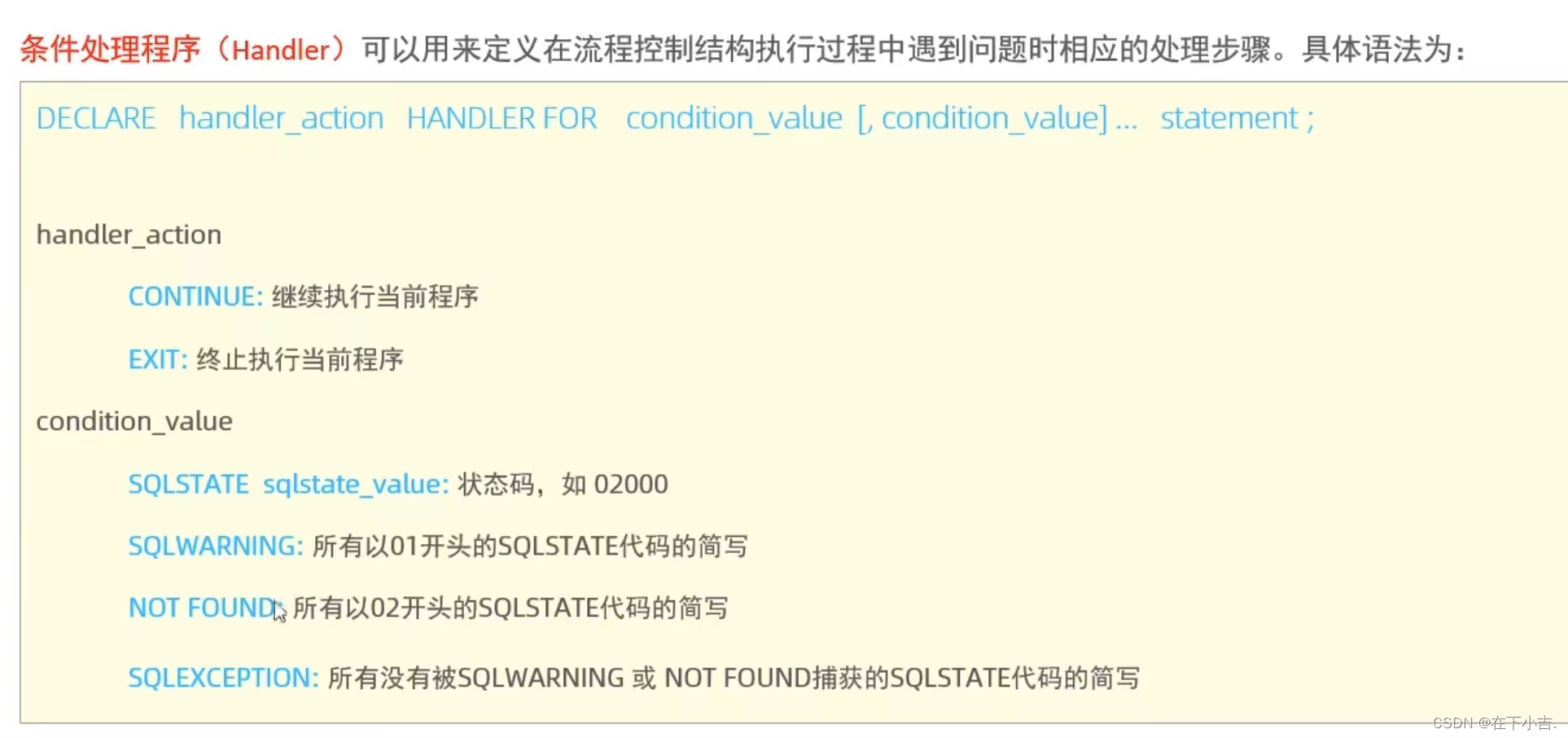
Add this piece of code to the code
declare exit handler for not found close u_course;


Storage function
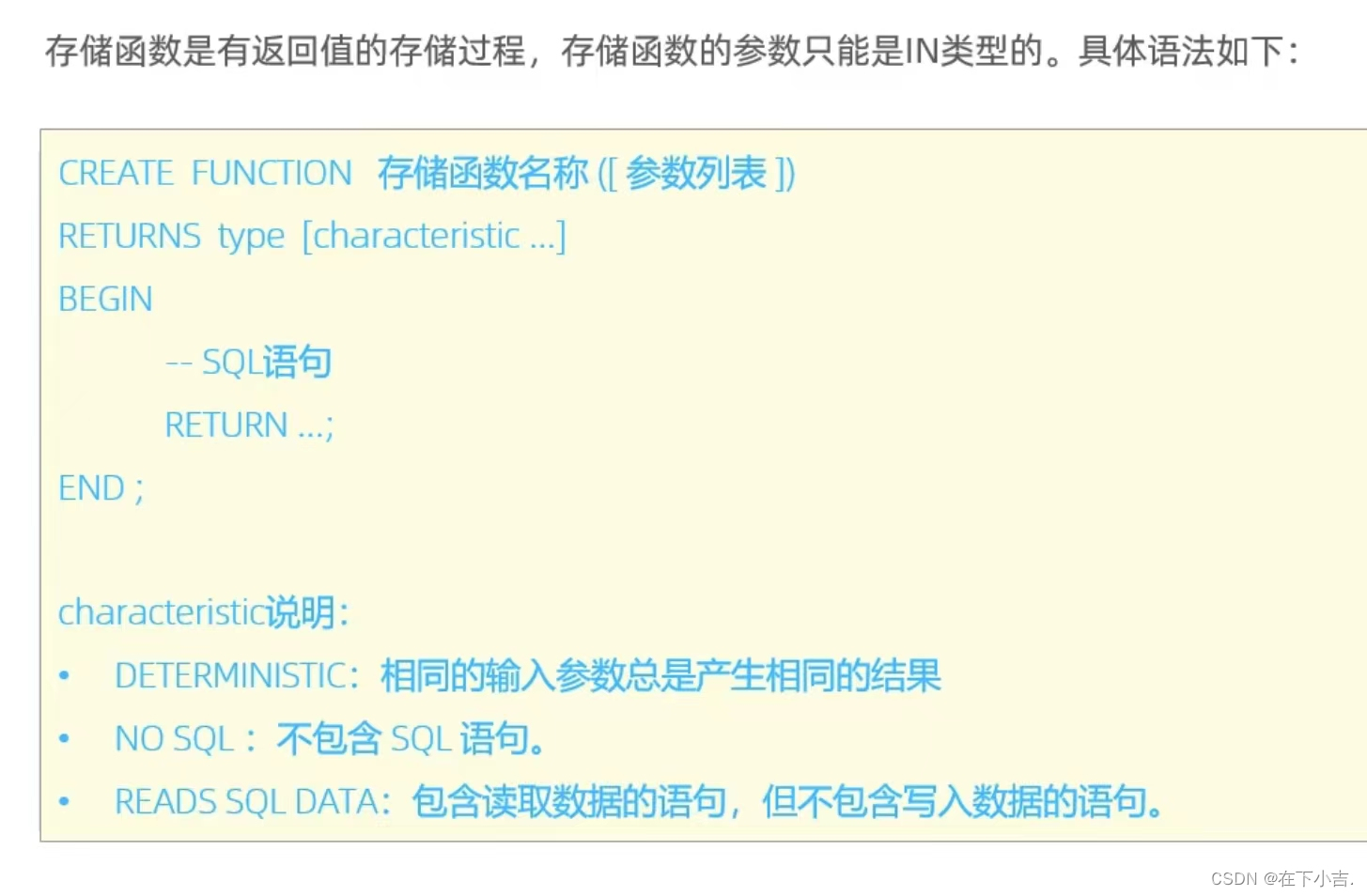
Calculate the value accumulated from 1 to n, n is the parameter value passed in
create function fun1(n int)
returns int deterministic -- specifies the characteristic deterministic
begin
declare total int default 0;
while n>0 do
set total:=total + n;
set n:=n-1;
end while;
return total;
end;
select fun1(100);

